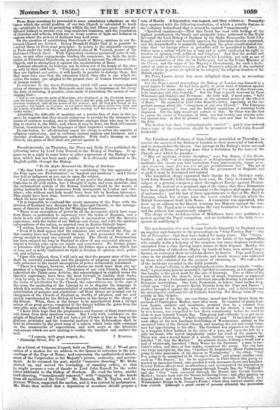Simultaneously, on Thursday, the Times and Daily Hews published the
following letter by Iiord John Russell to the Bishop of Durham. It appears to be a reply to some letter or other expression of the Bishop's opinion which has not been made public. It is obviously addressed to the English public through the Bishop.
"To the Right Reverend the Bishop of Durham.
"My dear lord—I agree with you in considering 'the late aggression of the Pope upon our Protestantism' as 'insolent and insidious' ; and I therefore feel as indignant as you can do upon the subject. "I not only promoted to the utmost of my power the claims of the Roman Catholics to all civil rights, but I thought it right, and even desirable, that the ecclesiastical system of the Roman Catholics should be the means of giving instruction to the numerous Irish immigrants in London and .elsewhere, who without sech help would have been left in heathen ignorance. This might have been dope, however, without any such innovation as that which we have now-seen.
"It is impossible to confound the ;went measures of the Pope with the :division of Scotland into dioceses by the Episcopal Church, or the arrangement of districts in England by the Wesleyan Conference.
"There is an assumption a power in all the documents which have come from Rome—a pretension to supremacy over the realm of England, and a claim M sole and undivided sway, which is inconsistent with the Queen's supremacy, with the rights of our Bishops and clergy, and with the spiritual independence of the nation, as asserted even in Roman Catholic times.
"I confess, however, that my alarm is not equal to my indignation.
"Even if it shall appear that the ministers and servants of the Pope in this country have net transgressed the law, I feel persuaded that we are strong enough to repel any outward attacks. The liberty of Protestantism has been enjoyed too long in England to allow of any successful attempt to impose a foreign yoke upon our minds and consciences. No foreign prince or potentate will be permitted to fasten his fetters upon a nation which has so long and so nobly vindicated its right to freedom of opinion, civil, political, and religious.
• "lJptin this subject, then, I will only say that the present date of the law shall be carefully examined, and the propriety of adopting any proceedings with reference to the recent assumptions of power deliberately considered.
"There is a danger, however, which alarms me much more than any aggression of a foreign Sovereign. Clergy-men of our Owill Church, who have subscribed the Thirty-nine Articles, and acknowledged in explicit terms the
i
Queen's supremacy, have been the most forward n 'coding their flocks, step by step, to the very verge df the precipice.' The honour paid to saints, the claim of infallibility for the Church, the superstitious use of the sign of the crass, the muttering of the Liturgy so as to disguise the language in 'which it is written, the eecommendation of auricular confession, and the administration of penance and absolution—all these things are pointed out by clergymen of the Church of England les Worthy Of adoption, and are now openly reprehended by the Bishop of London in his charge to the clergy. of his diocese. What, then, is the danger to be apprehended from a foreign Prince of no great power, compared to the danger within the gates from the unworthy sons of the Church of England herself? "I have little hepe that the propounders and framers of these innovations will desist from their insidious course. But I rely with confidence on the edeple of England ; and I will not bate a jot of heart or hope eo long as the glorious principles and tbe immortal martyrs of the Reformation shall be held in reverence by the great maw of a nation which looks with contempt on the mummeries of superstition, and " with scorn at the laborious endeavours which are now making to confine the intellect and enslave the soul.
"I remain, with great respect, &c. J. RUSSELL. " Downing Street, Nov. 4.'
























 Previous page
Previous page